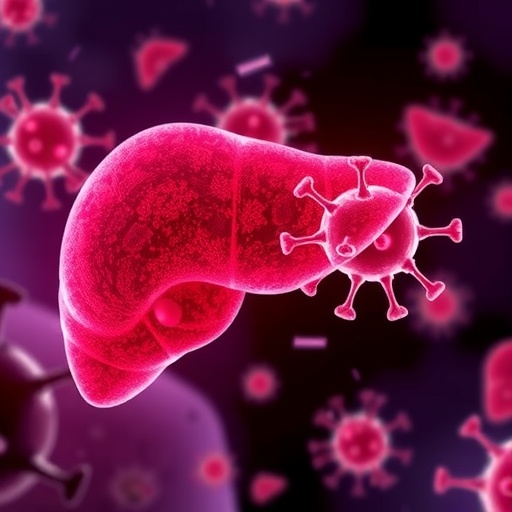Emerging research published in Genes & Immunity unveils a groundbreaking prognostic signature based on post-translational acylation modifications, illuminating new frontiers in the understanding and treatment of hepatocellular carcinoma (HCC). This malignancy, known for its aggressive progression and intricate tumor microenvironment, has long posed substantial challenges to effective clinical management. The study introduces a novel methodology integrating high-throughput bioinformatics and advanced machine learning techniques to dissect the multi-faceted roles of acylation, a post-translational modification, in HCC pathophysiology and immunotherapy responsiveness.
At the core of this investigation lies the comprehensive analysis of eleven distinct acylation modifications, including diverse modalities such as crotonylation, lactylation, succinylation, and others like benzoylation and butyrylation. These chemical alterations on protein substrates are known to intricately regulate cellular functions, yet their collective impact on HCC progression and prognosis had remained obscure. By generating consensus clusters from patient tumor data, researchers delineated two acylation modification-related subtypes with distinct molecular identities and clinical behaviors.
To unravel the genetic networks underpinning these subtypes, the team employed Weighted Gene Co-Expression Network Analysis (WGCNA). This approach facilitated the detection of gene modules closely correlated with acylation processes, enabling a refined understanding of the transcriptional programs operative within HCC tumors. Subsequently, machine learning algorithms were harnessed to distill these complex genetic profiles into a practical and quantifiable scoring system— the Acylation Modification-Related Gene score (AMRG.score).
This scoring system, comprising 21 rigorously selected key genes, stands as a powerful predictive tool for assessing patient prognosis. Its robustness was validated across multiple independent cohorts beyond the initial discovery set, including diverse datasets such as TCGA-LIHC, LIRI-JP, and several GEO repositories (GSE10143, GSE14520, GSE27150, GSE36376, and GSE76427), as well as a clinical in-house cohort. This extensive validation reinforces the generalizability and clinical relevance of the AMRG.score across heterogeneous patient populations.
Beyond its prognostic capabilities, the AMRG.score revealed profound insights into the intricacies of the tumor microenvironment (TME) in HCC. Patients with elevated scores were found to possess an immunologically active TME characterized by increased infiltration of immune effector cells and heightened expression of immune checkpoint molecules. Such immunological landscapes typically herald enhanced responsiveness to immunotherapies, underscoring the clinical utility of the AMRG.score in stratifying candidates for these treatments.
This study also sheds light on the dynamic interplay between acylation modifications and immunosuppressive mechanisms within HCC. Post-translational modifications like crotonylation and lactylation were implicated in modulating immune evasion pathways, which are pivotal barriers to effective antitumor immune responses. Understanding these modifications at a molecular level paves the way for novel therapeutic strategies that could synergize with existing immunotherapies to overcome resistance.
Furthermore, the integration of multi-omics data underscores the complexity of HCC biology, highlighting how epigenetic and metabolic alterations converge via acylation modifications to influence tumor behavior. This systems-level perspective is critical for developing precision oncology approaches, tailoring interventions based on individual tumor acylation profiles to maximize therapeutic benefit and minimize toxicity.
The identification and functional characterization of the 21 gene signature supporting the AMRG.score offer promising avenues for future research. These genes span diverse biological processes, from metabolic regulation to immune signaling, serving as potential biomarkers and therapeutic targets. Functional validation of these targets could spearhead the design of novel pharmacological agents aimed at modulating acylation-driven pathways.
Importantly, this research underscores the transformative potential of integrating computational biology and clinical oncology. Machine learning not only facilitated the stratification of complex data but also converted biological phenomena into actionable clinical metrics. This approach exemplifies the future of translational research, where data science amplifies the discovery-to-clinic pipeline.
The clinical implications of the AMRG.score extend to patient management paradigms. By predicting both prognosis and immunotherapy sensitivity, this tool empowers oncologists to make informed decisions regarding treatment intensity and modality. Patients with high AMRG.score might benefit from early and aggressive immunotherapeutic interventions, while those with lower scores could be spared unnecessary toxicity from less effective immune-based treatments.
From a broader perspective, the study highlights post-translational acylation as a vital frontier in cancer epigenetics and immunology. As an emerging category of modifications beyond classical phosphorylation and ubiquitination, acylation defines a new layer of regulatory complexity with significant translational promise. This conceptual advance invites the oncology community to revisit molecular mechanisms governing tumor-immune interactions.
The findings also encourage exploration into how acylation modifications might impact other cancer types and treatment contexts. Given the conserved nature of many acylation pathways, it is plausible that similar prognostic and therapeutic paradigms could be extrapolated beyond HCC, potentially revolutionizing personalized medicine across a spectrum of malignancies.
Ultimately, the integration of acylation biology into clinical prognostic frameworks and therapeutic design symbolizes a leap forward in the fight against HCC. This study equips researchers and clinicians with a refined lens to view tumor biology while providing patients with hope for more precise, effective treatment strategies rooted in molecular insight.
As the field progresses, future investigations will undoubtedly delve deeper into the mechanistic underpinnings of acylation-mediated immune modulation and its synergy with emerging immunotherapies, including checkpoint inhibitors and adoptive cell therapies. Combining such knowledge with innovative drug delivery systems could herald a new era of targeted, acylation-informed therapeutics.
In conclusion, this landmark study not only elucidates the prognostic value of acylation-related gene signatures in hepatocellular carcinoma but also bridges fundamental biology with clinical application. Through the creation and validation of the AMRG.score, the research offers a transformative tool capable of guiding personalized treatment and enhancing the efficacy of immunotherapy, marking a seminal contribution to oncology and immunology.
Subject of Research: Post-translational acylation modifications and their impact on immunosuppression and immunotherapy efficacy in hepatocellular carcinoma.
Article Title: Post-translational acylation modulates immunosuppression and immunotherapy efficacy in hepatocellular carcinoma.
Article References:
Li, Y., Bai, S., Hu, J. et al. Post-translational acylation modulates immunosuppression and immunotherapy efficacy in hepatocellular carcinoma. Genes Immun (2025). https://doi.org/10.1038/s41435-025-00362-2
Image Credits: AI Generated
DOI: https://doi.org/10.1038/s41435-025-00362-2
Tags: acylation modifications in liver canceracylation-related molecular subtypesadvanced cancer treatment strategiescrotonylation and lactylation in cancergene co-expression network analysishepatocellular carcinoma immunotherapyhigh-throughput bioinformatics in HCCimmunotherapy responsiveness in liver cancermachine learning in oncologypost-translational modifications in cancerprognostic signature for liver cancertumor microenvironment in hepatocellular carcinoma





